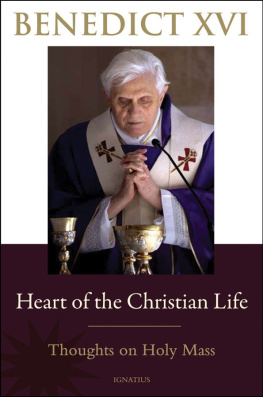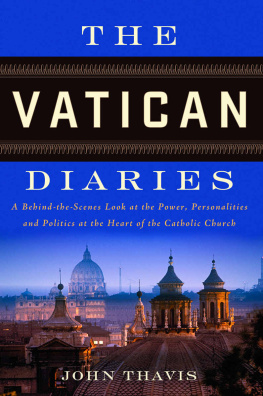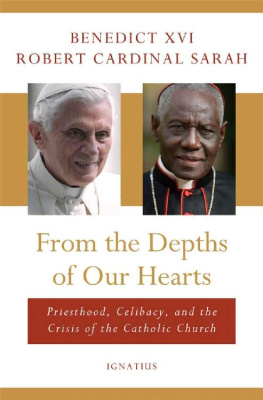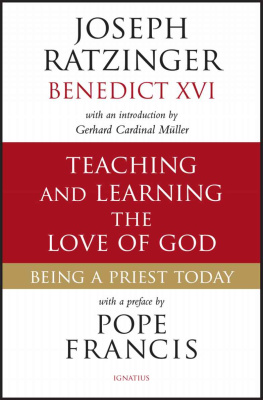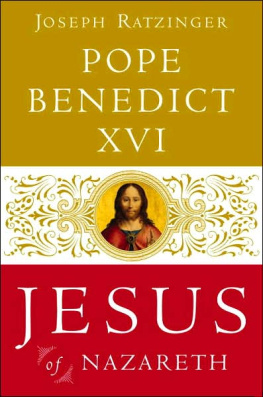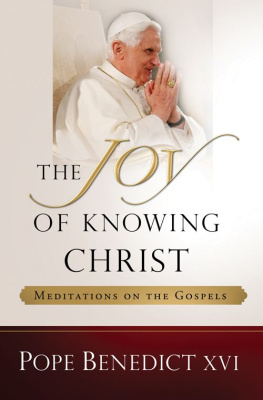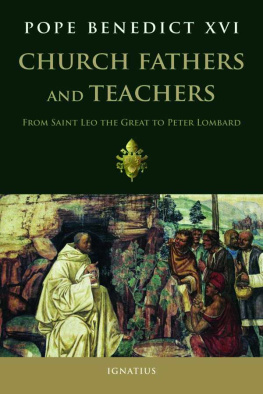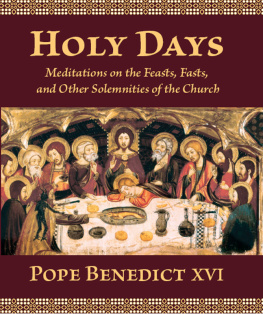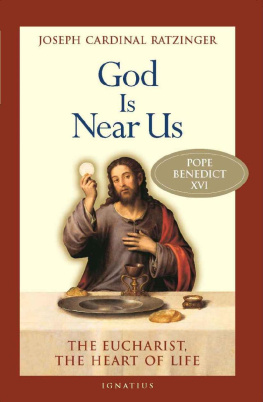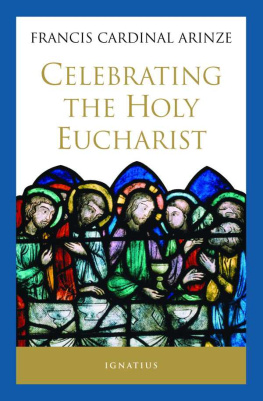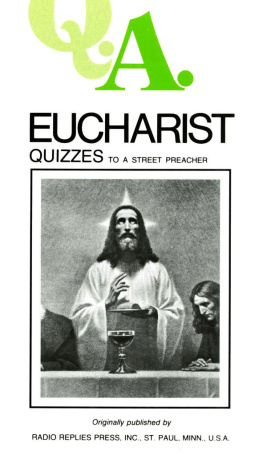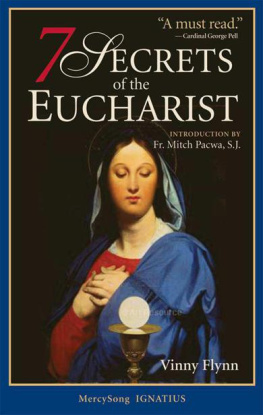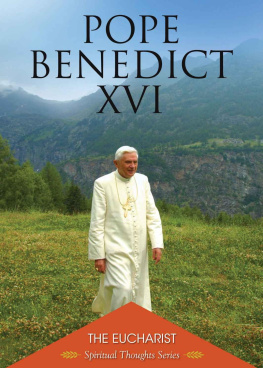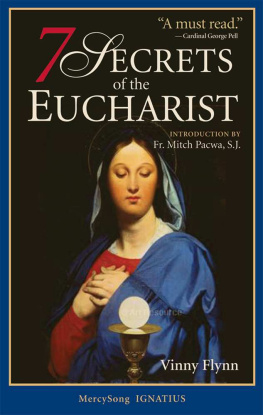HEART OF THE CHRISTIAN LIFE
BENEDICT XVI
Heart of the
Christian Life
~
Thoughts on the Holy Mass
IGNATIUS PRESS SAN FRANCISCO
Original German edition:
Herz des Christlichen Lebens: Gedanken zur Heiligen Messe
2008 by Sank Ulrich Verlag, GmbH, Augsburg, Germany
Cover photograph of Pope Benedict XVI
by Stefano Spaziani
Cover design by Roxanne Mei Lum
2010 by Ignatius Press, San Francisco
All rights reserved
ISBN 978-1-58617-432-3
Library of Congress Control Number 2009935081
Printed in the United States of America
CONTENTS
The Eucharist as the Way to Holiness
Jesus Christ: Incarnate Love of God
Friends of Jesus Christ
The Hope of the Grain of Wheat
The Church as a Eucharistic Community
God Is Not Far from Us
Sacrament of the Life of God
Eucharist: Source and School of Love
The Passion of Jesus
The Gift of the Self-dedication of Christ
THE BREAD OF LIFE
On the feast of Corpus Domini [Corpus Christi], the Church relives the mystery of Holy Thursday in the light of the Resurrection. There is also a Eucharistic procession on Holy Thursday, when the Church repeats the exodus of Jesus from the Upper Room to the Mount of Olives.
In Israel, the night of the Passover was celebrated in the home, within the intimacy of the family; this is how the first Passover in Egypt was commemorated, the night in which the blood of the paschal lamb, sprinkled on the crossbeam and doorposts of the houses, served as protection against the destroyer.
On that night, Jesus goes out and hands himself over to the betrayer, the destroyer, and in so doing, overcomes the night, overcomes the darkness of evil. Only in this way is the gift of the Eucharist, instituted in the Upper Room, fulfilled: Jesus truly gives his Body and his Blood. Crossing over the threshold of death, he becomes living Bread, true manna, endless nourishment for eternity. The flesh becomes the Bread of Life.
In the Holy Thursday procession, the Church accompanies Jesus to the Mount of Olives: it is the authentic desire of the Church in prayer to keep watch with Jesus, not to abandon him in the night of the world, on the night of betrayal, on the night of the indifference of many people.
On the feast of Corpus Domini , we again go on this procession, but in the joy of the Resurrection. The Lord is risen and leads us. In the narrations of the Resurrection there is a common and essential feature; the angels say: the Lord goes ahead of you to Galilee, where you will see him (Mt 28:7).
Taking this into deep consideration, we can say that this going ahead of Jesus implies a two-way direction.
The first is, as we have heard, Galilee. In Israel, Galilee was considered to be the doorway to the pagan world. And in reality, precisely on the mountain in Galilee, the disciples see Jesus, the Lord, who tells them: Go... and make disciples of all the nations (Mt 28:19).
The other preceding direction of the Risen One appears in the Gospel of Saint John, in the words of Jesus to Mary Magdalen: Do not hold me, for I have not yet ascended to the Father (Jn 20:17).
Jesus goes before us next to the Father, rises to the heights of God and invites us to follow him. These two directions on the Risen Ones journey are not contradictory, for both indicate the path to follow Christ.
The true purpose of our journey is communion with God. He himself is the house of many dwelling places (cf. Jn 14:2ff.); but we can be elevated to these dwelling places only by going toward Galilee, traveling on the pathways of the world, taking the Gospel to all nations, carrying the gift of his love to the men and women of all times.
Therefore, the journey of the Apostles extends to the ends of the earth (cf. Acts 1:6ff.). In this way, Saints Peter and Paul went all the way to Rome, a city that at that time was the center of the known world, the true caput mundi .
The Holy Thursday procession accompanies Jesus in his solitude toward the via crucis . The Corpus Domini procession responds instead in a symbolic way to the mandate of the Risen One: I go before you to Galilee. Go to the extreme ends of the world, take the Gospel to the world.
Of course, by faith, the Eucharist is an intimate mystery. The Lord instituted the Sacrament in the Upper Room, surrounded by his new family, by the Twelve Apostles, a prefiguration and anticipation of the Church of all times.
And so, in the liturgy of the ancient Church, the distribution of Holy Communion was introduced with the words Sancta sanctis : the holy gift is intended for those who have been made holy.
In this way a response was given to the exhortation of Saint Paul to the Corinthians: A man should examine himself first; only then should he eat of the bread and drink of the cup... (1 Cor 11:28).
Nevertheless, from this intimacy that is a most personal gift of the Lord, the strength of the Sacrament of the Eucharist goes above and beyond the walls of our Churches. In this Sacrament, the Lord is always journeying to meet the world. This universal aspect of the Eucharistic presence becomes evident in todays festive procession.
We bring Christ, present under the sign of bread, onto the streets of our city. We entrust these streets, these homes, our daily life, to his goodness. May our streets be streets of Jesus! May our houses be homes for him and with him! May our life of every day be penetrated by his presence.
With this gesture, let us place under his eyes the sufferings of the sick, the solitude of young people and the elderly, temptations, fearsour entire life. The procession represents an immense and public blessing for our city: Christ is, in person, the divine Blessing for the world. May the ray of his blessing extend to us all!
Our procession finishes in front of the Basilica of Saint Mary Major in the encounter with Our Lady, called by the dear Pope John Paul II, Woman of the Eucharist. Mary, Mother of the Lord, truly teaches us what entering into communion with Christ is: Mary offered her own flesh, her own blood to Jesus and became a living tent of the Word, allowing herself to be penetrated by his presence in body and spirit.
Let us pray to her, our holy Mother, so that she may help us to open our entire being, always more, to Christs presence; so that she may help us to follow him faithfully, day after day, on the streets of our life. Amen!
WITHOUT SUNDAY WE CANNOT LIVE
Glorify the Lord, Jerusalem; Zion, praise your God (Responsorial Psalm).
The invitation of the Psalmist that is also echoed in the Sequence expresses very clearly the meaning of this Eucharistic Celebration: we are gathered here to praise and bless the Lord. This is what urged the Italian Church to gather here in Bari on the occasion of the National Eucharistic Congress.
I also wanted to join all of you today to give special emphasis to the celebration of the Solemnity of the Body and Blood of Christ, thus to pay homage to Christ in the Sacrament of his love and at the same time to strengthen the bonds of communion that bind me to the Church in Italy and to her Pastors. My venerable and beloved Predecessor, Pope John Paul II, would also have liked to have been here at this important ecclesial event, as you know. We all feel that he is close to us and with us is glorifying Christ, the Good Shepherd, whom he can now contemplate directly.
I greet with affection all of you who are taking part in this solemn liturgy: Cardinal Camillo Ruini and the other Cardinals present, Archbishop Francesco Cacucci of Bari, whom I thank for his kind words, the Bishops of Puglia and those who have come here in large numbers from every corner of Italy; priests, men and women religious and lay people, particularly the young people, and of course, all those who helped in various ways with the organization of the Congress.
Next page
